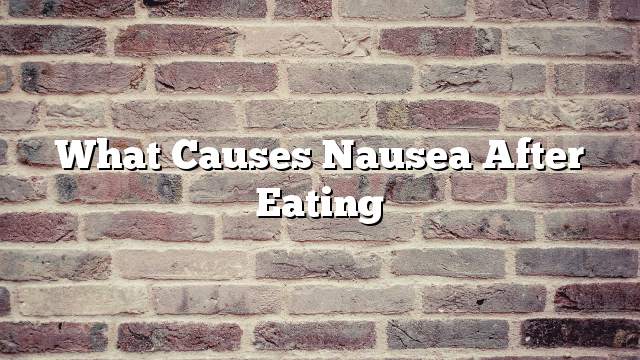Nausea is generally an annoying feeling that affects many people, especially after eating. This may be the result of excessive eating, but if you continue to feel this for a long time it indicates a problem in the digestive system specifically.
Stress, anxiety and stress as a psychological condition during eating, so feel nausea immediately after the completion of the meal, some are advised to drink some drinks that calm down nausea and vomiting, as well as some types of drugs, and continue to relax and deep breathing, and also prefer to change some lifestyles that May lead to increased stress and thus feeling nauseous.
Peptic ulcer is one of the diseases that people may suffer from a bacterium called Helicobacter pylori. The patient may feel gastric ulcers with burning pain and mild nausea after eating, so choose a balanced diet that contains the items that do not hurt the patient with this ulcer, Smoking It may cause irritation in the lining of the intestines and stomach to increase gastric acid secretion.
It may be nausea after eating meals as a result of difficulty digestion, as a result of eating some types of harmful foods such as fatty and fatty foods, as well as excessive intake of some types of food, may be indigestion due to stress or stomach cancer.
The sensitivity of some types of food may cause a feeling of nausea, especially those who are allergic to fish, some types of nuts, milk and some of its derivatives, as well as eggs and wheat and many others.
Nausea may be the result of pregnancy, it is a change in some hormones of the body, to reduce the ability of bowel movement, and thus increase the possibility of feeling nausea and vomiting, in addition to other symptoms.
It is best to avoid lying down immediately after eating meals, while reducing the intake of caffeinated beverages.
The feeling of nausea after eating may be caused by food poisoning, in addition to other symptoms such as vomiting, fever, some stomach cramps, as well as diarrhea.
Avoid eating solid foods until symptoms have disappeared. Avoid excessive spicy foods, fats, and avoid taking any type of medicine without consulting your doctor. Drink plenty of fluids to prevent dehydration.
People suffering from gastroenteritis may experience nausea especially after eating, as well as other symptoms such as vomiting with watery diarrhea, fever, and abdominal pain.
